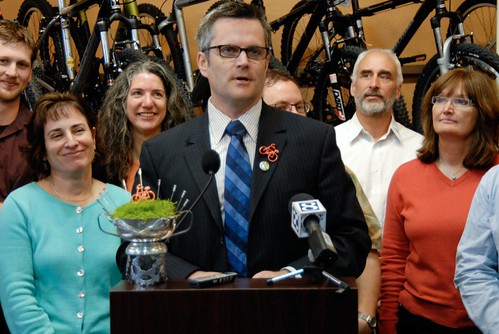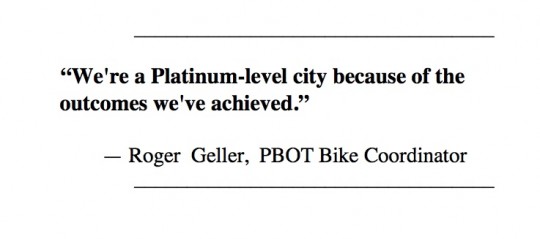“We’re a Platinum-level city because of the outcomes we’ve achieved.”— Roger Geller, PBOT Bike Coordinator
The Bureau of Transportation wants to remind everyone that Portland still deserves to be Platinum.
As local activist Will Vanlue continues to gain traction and headlines for his petition (it’s up to 550 signatures) to have Portland’s Platinum bicycle-friendly status downgraded by the League of American Bicyclists, PBOT has gone on the defensive.
The agency has put together a seven-page document outlining their case and they reached out to us for a conference call this morning to talk about it. On the call was PBOT Bike Coordinator Roger Geller, spokesman Dylan Rivera, and Margi Bradway the manager of PBOT’s Active Transportation division.
Geller opened up the conversation with a spirited defense of PBOT’s bike legacy which he delivered as if he were speaking to supporters at a political rally:
“We’re a Platinum-level city because of the outcomes we’ve achieved.
We’re Platinum because since 2000 bicycle transportation has contributed the most to our drop in drive-alone commute trips. Of the 40,000 additional commute trips since 2000, more than one-third of them have been from bicycling. So bicycle transportation is contributing the most to keeping congestion at bay.
We’re a Platinum-level city because our school kids are riding to school eight times the national average. And since 2006 we’ve seen a 35 percent increase in kids walking and biking to school.
We’re a Platinum-level city because we just installed our 125th bike corral and a there’s a good cross-section of business owners across the city who recognize that, as research shows, people who are riding bikes to commercial districts are spending more money than people who are arriving by any other way. And we have enough people going to commercial districts by bike that we need 125 bike corrals — and more!
It’s about outcomes. What we’re seeing are the outcomes.”
Those examples and more fill up the pages of a document titled Affirming Portland’s Platinum Status: Efforts since 2013 (PDF). PBOT sent me the document prior to our phone conversation.
“When you look at other cities who are upping their game on biking, the dollar amounts are [equal to] our entire capital budget… If we had three times the funding we could do three times the work.”
— Margi Bradway, PBOT Active Transportation Division Manager
The document outlines 26 bike-related projects that PBOT has completed since 2013 and lists 10 upcoming projects that are already funded and in the works. It also gives updates on the city’s big education and enforcement initiatives like Sunday Parkways, the High Crash Corridor program, their “embrace” of Vision Zero, and their efforts to reduce speed limits.
Geller’s defense, however, came with an acknowledgment that PBOT has a lot of work to do. “We’re not done,” he said. “We’re a quarter of the way to where our plans [Climate Action Plan, Bike Plan, Portland Plan] tell us we need to be. We’ve built only a third of our network and we’re continuing to advance.”
Geller’s biggest concern is that the downgrade petition sends the wrong message, one that focuses on what people don’t like and one that puts PBOT on the defensive. “What people in the city need to know is that there’s support for these things and people want more of them. That’s a positive message that needs to be embraced by people in general: ‘We like the direction this is going, give us more.'”
Rivera, Bradway, and Geller all said funding is the big constraint.
“When you look at other cities who are upping their game on biking,” explained Bradway, “they are making major investments and the dollar amounts are [equal to] our entire capital budget… If we had three times the funding we could do three times the work.”
Advertisement
Then Geller added: “We agonize over $50,000. [He used an example of newly striped buffered bike lanes on a section of NE Killingsworth that was done as part of a pavement maintenance project]. It’s not a lot of money in transportation terms but it’s a third of the local discretionary funding we have available annually for making bike improvements. And what does that get us? One mile of buffered bike lanes…So that’s the environment we are working in.”
Then I asked: If Portland is doing all this for bikes and with so little funding, where is all this frustration in the public coming from?
Geller’s answer was spot-on in my opinion:
“I think we rightfully, raised the expectations of what Portland can achieve. Going back to the Portland Bicycle Plan for 2030, and certainly going back to commissioner and then Mayor [Sam] Adams right? We started talking about Portland being a world-class bicycling city. And I think people are understandably frustrated that we are not there yet… There’s a level of frustration that we are not living up to our potential.”

(Photo J. Maus/BikePortland)
City Hall politics plays a huge role in Portland’s bike-friendly stature. I brought that issue up, but both Bradway and Geller didn’t think it was right for them to talk about it.
However, Geller had a lot to say about what the community could do differently to influence City Hall denizens.
Geller thinks that instead of hearing outrage from the community about PBOT’s lack of progress, Mayor Charlie Hales and the other commissioners would be more persuaded by statements of support — of both PBOT and more bike-related investments.
“I think if the end goal is a much more bike-friendly city I’m not sure this is the way to do it,” Geller said. “I think the frustration would be better channeled by going to City Council and telling them, ‘We want more and better bike facilities.'”
Here’s more from Geller:
“I think that whatever Will’s intent was, the message coming through is, ‘You guys are doing really badly and we don’t want to have anything to do with you. That’s just a dispiriting message for people who are making decisions about where should we spend our money. Should we spend our money where we’re getting support and people like what we’re doing? Or should we spend it where we get this huge, national outcry where we hear, hey you guys are doing poorly?”
It’s an interesting question to ponder: What if, for example, the 500-plus downgrade petition signers instead signed up to testify during the open communication period before City Council meetings? How would one year of hundreds of three-minute testimonies about the positive impact biking is having on Portlander’s lives — and how citizens want more of it — impact council members?
Earlier in our conversation I mentioned my concern that the community often demonstrates widespread support for biking, but then the City seems to make a decision based on one or two powerful people or special interest groups. I mentioned how we could “Get 1,000 people out on the street” to support biking but it wouldn’t matter if the City just listened to the most powerful people (like the Portland Business Alliance, for one).
Bradway and Geller both seemed to be eager to witness such a powerful demonstration for biking — but it hasn’t happened.
Geller then relayed a story from his ride into work this morning. He saw a protest (unrelated to biking) on SE Madison where about 100 people were holding up signs. “I’ve yet to see a 1,000 people on the street. That would be great if we had even 200 people in front of City Hall holding up signs.”
— Download PBOT’s Affirming Portland’s Platinum Status: Efforts since 2013.


